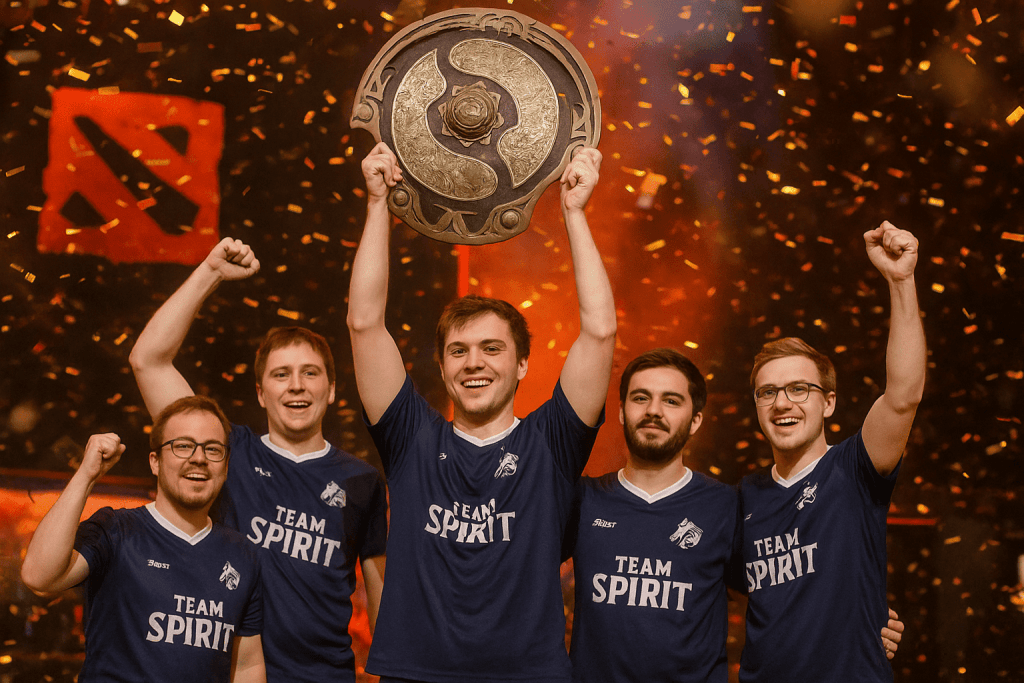Breaking Down Team Spirit’s Winning Strategy in Dota 2
In the fiercely competitive arena of professional Dota 2, few teams have captured the imagination of fans like Team Spirit. Their recent championship victories are more than just a testament to raw skill — they are the result of meticulous preparation, strategic brilliance, and flawless teamwork. In this article, we’ll break down the essential elements that made their winning strategy so effective, with insights rooted in competitive gaming expertise and well-established esports analysis.
The Foundation: Drafting Like a Chess Grandmaster
The draft phase in Dota 2 is akin to laying the foundation of a skyscraper — one wrong move, and the whole structure can crumble. Team Spirit’s coach and players have consistently demonstrated deep hero pool mastery, ensuring they remain unpredictable to opponents.
Key Drafting Elements:
- Flex Picks: Heroes like Puck, Tiny, and Pangolier, which can be placed in multiple roles, give them flexibility and force opponents into uncomfortable bans.
- Counter-Bans: They don’t just draft for themselves; they strategically deny meta-defining heroes from their rivals.
- Synergy Focus: Every hero selection builds toward a coordinated game plan, whether it’s teamfight dominance or pick-off execution.
This adaptability makes it nearly impossible for enemy teams to prepare a single counter-strategy.
Early Game Control: The Art of Pressure
Team Spirit’s early game revolves around smart aggression — they apply pressure without overextending, forcing opponents to react rather than dictate.
Their laning phase success comes from:
- Lane Swaps: Identifying unfavorable matchups early and adjusting lanes mid-game.
- Vision Domination: Early wards in enemy jungle pathways to predict rotations.
- Resource Efficiency: Maximizing every creep wave, neutral camp, and rune spawn to secure incremental advantages.
By minute 15, they often hold a net worth lead, setting the tone for the mid-game.
Mid-Game Momentum: Turning Leads into Victories
The mid-game is where Team Spirit truly shines. Their coordination in timing key objectives—Roshan, Tier 2 towers, and map control—ensures they maintain momentum.
They excel in:
- Item Timings: Capitalizing on core heroes hitting power spikes (Blink Daggers, Black King Bar, etc.) to force fights.
- Pick-Off Plays: Using heroes like Spirit Breaker or Storm Spirit to isolate and eliminate key targets before major objectives.
- Map Chokeholds: Aggressively placing wards in enemy territory to restrict farm and vision.
This disciplined yet aggressive playstyle forces opponents into defensive positions, eroding their win conditions.
Late Game Composure: Winning Under Pressure
Many teams falter when matches stretch beyond the 40-minute mark. Team Spirit thrives in these scenarios. Their late-game decision-making is rooted in trust, experience, and precise execution.
- Split-Push Discipline: Applying pressure in multiple lanes to stretch enemy defenses thin.
- Buyback Management: Tracking not just their own buybacks but also the enemy’s, allowing for decisive high-ground pushes.
- Patience Over Impulse: Waiting for the perfect fight rather than taking unnecessary risks.
Even in the most chaotic situations, Team Spirit maintains a calm, calculated approach — a hallmark of championship-level teams.
Player Synergy: Trust as the Secret Weapon
Team Spirit’s roster doesn’t just consist of skilled individuals; it’s a well-oiled machine where every player understands their role.
- Yatoro (Carry): Master of adaptability, capable of piloting hyper-aggressive or farm-heavy heroes with equal effectiveness.
- TORONTOTOKYO (Mid): Brings creativity and unpredictability, often tilting opponents with unorthodox picks.
- Collapse (Offlane): Known for game-changing initiations that set the pace of teamfights.
- Mira & Miposhka (Supports): The backbone of vision control, clutch saves, and coordination.
This synergy isn’t built overnight — it’s forged through countless hours of practice, review sessions, and a shared commitment to victory.
Psychological Edge: The Confidence Factor
Dota 2 is as much a mental game as it is mechanical. Team Spirit’s ability to remain composed under pressure gives them an intangible edge. Their resilience in high-stakes matches — even when facing early deficits — comes from a collective belief in their strategy and execution.
- Composure Under Adversity: Never panicking after a lost fight or failed smoke gank.
- Mind Games: Forcing enemy teams into mistakes by controlling vision and tempo.
- Crowd Energy Utilization: Feeding off live event energy rather than letting it become a distraction.
Training & Preparation: Beyond the Game
Behind every on-stage victory lies a rigorous preparation process. Team Spirit’s pre-match training includes:
- Reviewing opponent replays to identify tendencies.
- Testing multiple draft scenarios in scrims.
- Discussing contingencies for both ideal and worst-case situations.
By preparing for everything, they minimize the possibility of being caught off guard.
Why Their Strategy Works So Well
The magic of Team Spirit’s approach is balance — they blend calculated risk-taking with structured play. They understand the evolving Dota 2 meta but also bring innovations that force the meta to evolve around them.
Their success formula:
Draft Adaptability + Early Pressure + Mid-Game Control + Late-Game Patience + Unshakable Team Synergy
FAQs: Breaking Down Team Spirit’s Strategy
Q1: What is Team Spirit’s biggest strength in Dota 2?
Their biggest strength lies in adaptability — both in drafts and in-game decision-making.
Q2: How does Team Spirit handle stronger early-game opponents?
They focus on minimizing losses in lanes, securing key farm, and using vision to avoid unnecessary fights until they hit their item timings.
Q3: Can other teams replicate Team Spirit’s strategy?
While certain elements are replicable, their deep synergy and trust take years to develop, making direct replication challenging.
Q4: What heroes define Team Spirit’s playstyle?
Flexible heroes like Tiny, Puck, and Pangolier, alongside impactful supports such as Rubick and Disruptor, often define their strategies.
Q5: How important is coaching in Team Spirit’s success?
Extremely important — the coach’s ability to analyze opponents and guide drafting is critical to their consistent performance.

